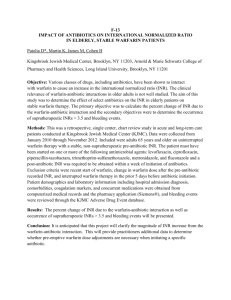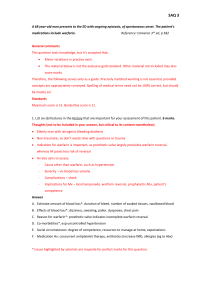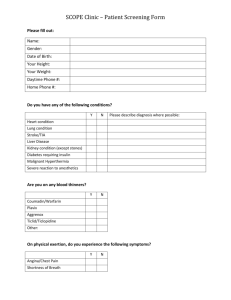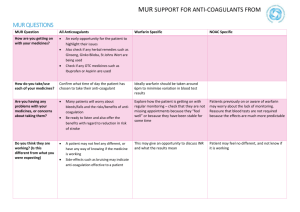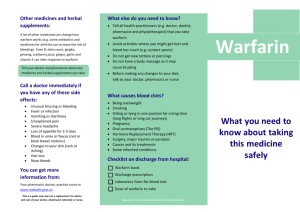Patient Information Leaflet
advertisement
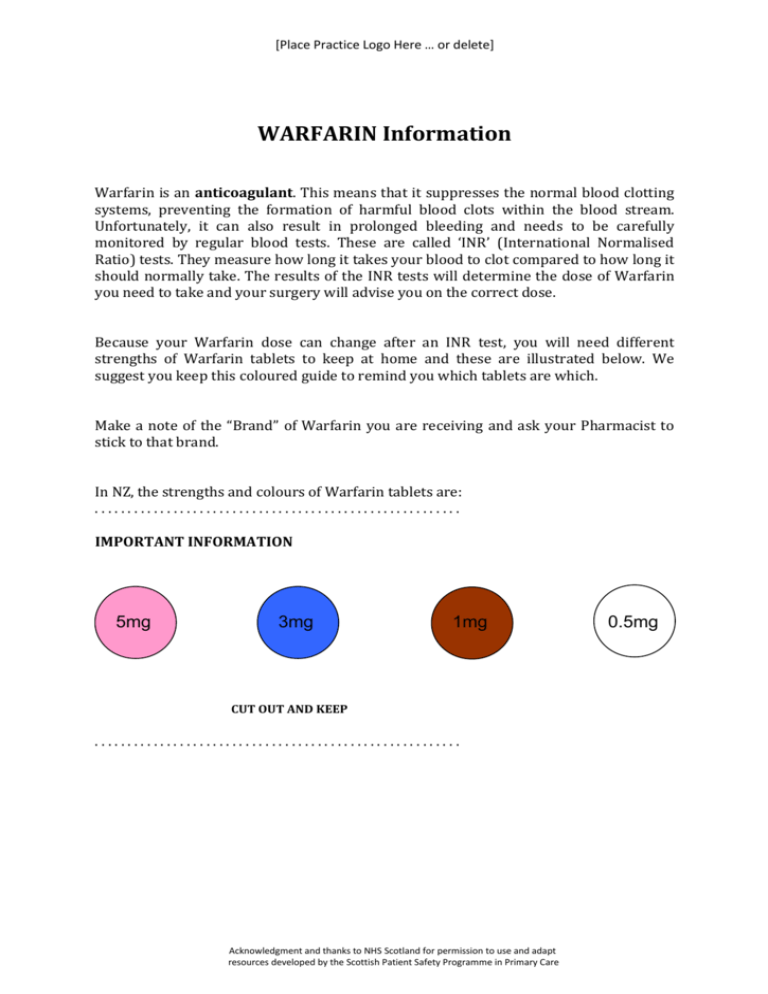
[Place Practice Logo Here … or delete] WARFARIN Information Warfarin is an anticoagulant. This means that it suppresses the normal blood clotting systems, preventing the formation of harmful blood clots within the blood stream. Unfortunately, it can also result in prolonged bleeding and needs to be carefully monitored by regular blood tests. These are called ‘INR’ (International Normalised Ratio) tests. They measure how long it takes your blood to clot compared to how long it should normally take. The results of the INR tests will determine the dose of Warfarin you need to take and your surgery will advise you on the correct dose. Because your Warfarin dose can change after an INR test, you will need different strengths of Warfarin tablets to keep at home and these are illustrated below. We suggest you keep this coloured guide to remind you which tablets are which. Make a note of the “Brand” of Warfarin you are receiving and ask your Pharmacist to stick to that brand. In NZ, the strengths and colours of Warfarin tablets are: ........................................................ IMPORTANT INFORMATION 5mg 3mg 1mg CUT OUT AND KEEP ........................................................ Acknowledgment and thanks to NHS Scotland for permission to use and adapt resources developed by the Scottish Patient Safety Programme in Primary Care 0.5mg You should have been given an anticoagulant record book (the Yellow Book). Read this carefully and always carry it with you to the surgery. Use it to keep a record of your INR and dosage. Ask for assistance filling it in if you are not sure how to do this. Always carry a Warfarin warning card. If you don’t have a Warfarin card then please ask the practice for one. When to avoid Warfarin Warfarin can affect the development of a baby in early pregnancy, so it is not routinely used during pregnancy, breast feeding or if you are trying for a baby. Warfarin should be avoided if you have: High Blood Pressure which is not controlled by tablets Peptic Ulcer Bacterial endocarditis (infection of heart lining and heart valves) Adverse Effects The most serious adverse effect of Warfarin is bleeding. You MUST seek medical attention and arrange an urgent test if you experience any of the following: Bleeding gums Passing blood in your urine or faeces Passing black faeces Severe bruising Long nose bleeds (lasting longer than 10 minutes) Blood in your vomit or coughing up blood Unusual headaches (In women) heavy or increased bleeding during your period, or any other bleeding from the vagina. You must seek immediate medical attention if you: Are involved in a major accident Receive a significant blow to the head Are unable to stop any bleeding from cuts, wounds or shaving Less common adverse effects of Warfarin include: Rashes Nausea (feeling sick) Vomiting Diarrhoea Interactions with Other Medicines When two or more medicines are taken at the same time, the effects of one of the medicines can be altered by the other. This is known as a drug interaction. Warfarin can interact with many medicines. This includes common medicines such as some painkillers and some antibiotics. If you want to check that your medicines are safe to take with Warfarin, ask your GP or LOCAL PHARMACIST, or read the patient information leaflet that comes with your medicine. It is safer to buy medicine from a chemist where the pharmacist is available than buying over the counter medicines in a supermarket. Lots of herbal medicines, such as St. John’s Wort and supplements can interact with Warfarin. Do not start taking any new herbal medicine or supplement without checking with your GP or pharmacist. Aspirin and other Painkillers If you are on Warfarin: Do not start taking Aspirin or drugs that contain Aspirin Do not take Ibuprofen, Diclofenac or Naproxen You can take Paracetamol but do not take more than the recommended dose. Be aware that Paracetamol ‘Plus’ contains Aspirin. Interactions with food Some foods affect the level of Warfarin in your body and changing your diet suddenly can affect your Warfarin levels. Foods that contain Vitamin K will lower your INR and increase the risk of blood clotting. This includes leafy green vegetables, such as broccoli, cabbage, spinach and brussels sprouts. These foods are good for you so there is no need to avoid them but you need to keep your intake consistent from day to day. It is recommended that you avoid cranberry juice as it increases the risk of bleeding. If you have any specific questions or need further advice, ask your GP or practice nurse. Interactions with Alcohol It is dangerous to binge drink or get drunk while taking Warfarin. Doing this may increase the effect of Warfarin and so increase the risk of bleeding. Do not drink more than 3 units of alcohol a day if you are a man, or 2 units a day if you are a woman. It is not safe to save up units to have on one day. One unit is roughly equivalent to a small bottle (330ml) of beer or lager, a single measure (25ml) of a spirit such as vodka, or a small glass (100ml) of wine. People with liver disease who are taking Warfarin should not drink alcohol. Taking your Warfarin Warfarin is taken once a day. It is important to take your tablet(s) at the same time each day washed down with a full glass of water. It is often best to take it at about 6pm as this fits in with the timing of your blood results. Very high or very low INR results are usually phoned to the practice on the day of the test. It means we can contact you to adjust your warfarin that day. It is essential that you inform the practice of any changes in your contact details. Ask your Pharmacist to give you the same brand of Warfarin tablets every time you collect a prescription. There are small variations in the strength of Warfarin from different manufacturers. Missed Doses If you forget to take your dose of Warfarin but remember within three hours, you can still take that dose. If it is more than three hours late, you should not take it. Make a note in the yellow booklet that you missed a dose and take a normal dose the next day at the usual time. Never take a double dose to catch up. If you are not sure what to do if you have missed a dose, ask your GP. Extra Doses or Wrong Doses If you accidentally take an extra dose or take the wrong dose of Warfarin, contact your GP for advice and make a note in the yellow booklet. Important Information About Warfarin Never take more than the prescribed dose. If you suspect that you or someone else has taken an overdose of this medicine go to the Accident and Emergency Department of your local hospital at once. This medicine is for you. Never give it to other people even if their condition appears to be the same as yours. Never stop taking Warfarin without medical supervision. FREQUENTLY ASKED QUESTIONS: What happens if I need an operation or teeth taken out? Due to the risk of bleeding, your dose of Warfarin may have to be lowered or stopped a few days before an operation or removal of teeth. You must tell your surgeon or dentist you are on Warfarin. What do I do if I have a nosebleed? If you have a nosebleed, carry out normal first aid: Lean your head forward Pinch just below the bridge of your nose firmly for at least 10 minutes If the nosebleed lasts longer than 15 minutes or you have regular nosebleeds, contact the surgery to get your INR checked. Can I have normal vaccinations? Yes. Your GP or practice nurse will take extra precautions to avoid the risk of bleeding, such as applying firm pressure to the injection site for 10 minutes afterwards. Can I play sports? Yes, you should try to lead as normal a life as possible but due to risk of bleeding: Sports such as football, rugby, cricket and hockey are best avoided if played competitively Martial arts and kickboxing must be avoided Non-contact sports such as running, athletics, cycling and racquet sports can be played. Wear the right protective clothing, such as cycle helmets and knee padding. Can I still go on holiday? If you are going on holiday, in this country or abroad, tell your GP and arrange to have your INR checked just before you go. If you are away for longer than a month, you may need to arrange to have your INR checked locally. Make sure you have enough Warfarin tablets to last your trip. Finally Never be afraid to ask any of the practice nurses or doctors for advice in relation to any queries or problems you encounter while taking Warfarin. We are here to provide a quality service and guidance when required. Adapted with kind permission from the NHS Scotland Patient Safety in Primary Care Program
